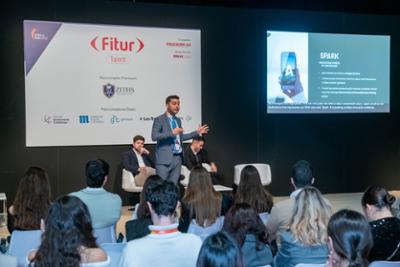

FITUR Talent 2025 highlights technology and personalization as key drivers for the future of tourism talent
Experts agree that corporate transparency, professionalization, and personalized employee relations are competitive advantages for attracting and retaining talent.
64% of employment in the hospitality sector is concentrated in age groups over 35 years old.
Talent as a driving force for the development of tourism was the central theme of the sixth edition of FITUR Talent, the section of the International Tourism Trade Fair organized by FITUR in collaboration with EDUCACIÓN 3.0. Under the slogan ‘How to Attract and Retain Talent in the Tourism Industry: Best Practices and Success Stories’, this space hosted high-level presentations with participation from HR experts, academic institutions, companies, and industry leaders who shared their knowledge and experience in the sector.
With RRHH Digital as Media Partner, FITUR Talent held in Hall 9 at the IFEMA MADRID, and it began with a conversation between Vicente Lorente, Director of the Hospitality School, and Amaia Echevarría, Director of Asia Gardens Hotel and Coordinator of the Advanced Course in Event Management. They addressed the sector's challenges and opportunities, emphasizing the need for professionalization and specialization as essential tools for retaining and motivating talent in the industry.
According to experts, this sector, critical for tourism and the economy, faces high employee turnover and a concerning talent drain, exacerbated by the lack of specific employee training—58% of workers lack it—as well as other negative factors, such as the low perception of work-life balance. ‘People need to be at the heart of management’, said Echevarría, who also emphasized that the hospitality industry must focus on service personalization, quality, and sustainability to meet the demands of a more digitalized and environmentally conscious tourist profile. “Hospitality is about adding unique value to service, with specialized and professional talent, and the tourism sector is particularly equipped with the know-how to address customers' evolving needs,” Echevarría stated.
Lorente highlighted Madrid's tourism development as an example, citing its increasing investment in continuous training and professionalization, particularly in luxury markets. Both agreed on the importance of dignifying the profession and fostering leadership that firmly believes in training as a driver of better customer experiences and economic profitability in the sector. They also noted the emergence of new professional profiles in the sector, such as sustainability experts, direct booking specialists, and gastronomy experts, reflecting the sector's evolving demands. ‘Customer loyalty is the key metric to measure the return on investment in talent’, Lorente concluded.
Professional Training and Youth Talent: Challenges for the Sector
‘Creating Opportunities in Hospitality and Tourism’ program, launched in 2014 to improve employability and facilitate youth employment, was presented by Isabel Ponce Velasco, Project Coordinator at Fundación Mahou San Miguel. She shared concerning data about the industry's future, noting that 64% of hospitality employment is concentrated in age groups over 35 years old. Despite a 35% increase in vocational training enrollment since 2018, enrollment specifically in hospitality-related fields has decreased by nearly 10%, indicating that “fewer young people are choosing hospitality vocational training.”
In the New Age Talent session, Bartolomé Deyà, Professor at the Faculty of Tourism at the University of the Balearic Islands, explained that tourism companies primarily seek talent with specific and rigorous knowledge due to the sector's highly diverse and ever-changing nature. He emphasized that skills such as language proficiency, which “opens and closes many doors,” and technology are key differentiators in the sector. The presentation also featured Jaume Monserrat Quintana, President of Turistec, and Mireia Faugier Santaularia, CEO of DirectBeds, who emphasized that AI is having a profound impact on tourism and is a tool that "transforms and catalyzes change."
Through the Shaping the Future of Hospitality: The Next GM Spain 2025 program, Andreu Oré, Global Director of Enrollment & Institutional Relations; Rubén Marín Nicolás, President of AEDH Talento Joven; and Nacho González Vázquez, National Vice President of AEDH Talento Joven, discussed their initiative to nurture young talent in the hotel sector. They noted the rise of luxury tourism in Spain, which now surpasses countries like France, Italy, Greece, and the United States. “This sector demands excellence, attention to detail, personalization, and, consequently, enhances professional growth,” Marín explained.
Active Listening to Improve Employee Well-being and Performance
In the panel discussion ‘Listen and Connect: Personalization and Commitment in Talent Retention’, moderated by Montse Pereira, HR Director at Grupo Valora, experts emphasized the importance of active listening and personalization in retaining talent in the hospitality sector. Sonia Martínez, President of GEHOCAN, highlighted that “the greatest competitive advantage in retaining employees is transparency,” as well as aligning company goals with employee aspirations.
María Isabel Almandoz, a specialist in HR and talent management at Canarian Hospitality, discussed the impact of workplace flexibility and well-being, noting that employees value factors such as respectful schedules and tools to support physical and mental health. Daniel Padrón, HR Director at INCABE, emphasized that companies now offer not just jobs but experiences, highlighting the importance of innovative recruitment processes that inspire and captivate.
Participants also shared key initiatives like ‘Coffee with the CEO’ and ‘Green Time’ to enhance internal well-being, as well as efforts to gather external feedback to understand what future talent values and needs. According to the data presented, 45% of employees plan to change jobs, and 60% would do so for a less lucrative but more attractive offer.
Mireia Faugier, mentor and tourism expert, stated that fostering talent involves placing people at the center and listening to new generations, who prioritize characteristics such as free time, constructive feedback, alignment with company values, career growth opportunities, and structured onboarding processes.
The event concluded with a session led by Begoña Fernández Benítez, Tourism Coordinator at the Escola d'Enoturisme de Catalunya, and Gerard Domingo Blanch, Director of the Escola d'Enoturisme de Catalunya, who emphasized the importance of talent in enhancing competitiveness in niche tourism sectors such as wine tourism. Additionally, Mulemwa Moongwa from Zambia Institute of Tourism & Hospitality Studies presented Zambia's commitment to developing talent in the tourism industry.





